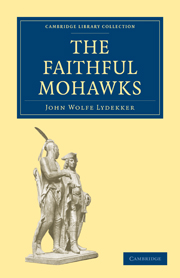Book contents
- Frontmatter
- Contents
- ILLUSTRATIONS
- FOREWORD BY THE RIGHT HONOURABLE LORD TWEEDSMUIR, G.C.M.G., C.H.
- PREFACE
- ABBREVIATIONS
- INTRODUCTION
- Chapter I PRELUDE (1664–1704)
- Chapter II THE FIRST DECADE (1704–1713)
- Chapter III THE NEXT THIRTY-THREE YEARS (1714–1746)
- Chapter IV THE CONFLICT FOR CANADA (i) (1747–1755)
- CHAPTER V THE CONFLICT FOR CANADA (ii) (1756–1760)
- CHAPTER VI THE YEARS BETWEEN (1761–1774)
- CHAPTER VII THE REVOLUTIONARY WAR (1775–1782)
- CHAPTER VIII “THE FAITHFUL MOHAWKS” (1783–1807)
- Appendix
- BIBLIOGRAPHY
- INDEX
- Plate section
Chapter IV - THE CONFLICT FOR CANADA (i) (1747–1755)
Published online by Cambridge University Press: 07 September 2010
- Frontmatter
- Contents
- ILLUSTRATIONS
- FOREWORD BY THE RIGHT HONOURABLE LORD TWEEDSMUIR, G.C.M.G., C.H.
- PREFACE
- ABBREVIATIONS
- INTRODUCTION
- Chapter I PRELUDE (1664–1704)
- Chapter II THE FIRST DECADE (1704–1713)
- Chapter III THE NEXT THIRTY-THREE YEARS (1714–1746)
- Chapter IV THE CONFLICT FOR CANADA (i) (1747–1755)
- CHAPTER V THE CONFLICT FOR CANADA (ii) (1756–1760)
- CHAPTER VI THE YEARS BETWEEN (1761–1774)
- CHAPTER VII THE REVOLUTIONARY WAR (1775–1782)
- CHAPTER VIII “THE FAITHFUL MOHAWKS” (1783–1807)
- Appendix
- BIBLIOGRAPHY
- INDEX
- Plate section
Summary
The temporary abandonment of the Society's Mission to the Iroquois in consequence of Mr Barclay's transfer to New York occurred at a time of danger and difficulty to the American Colonies. The destruction of Saratoga was followed by further hostile raids by the French and their Indian allies, and for the next two years the frontiers of New York, New Hampshire, and Massachusetts were subjected to numerous incursions by the enemy. To make matters more complicated, a strong party in New York was opposed to the war because of its detrimental effect on trade with Canada, and Governor Clinton's measures for the protection of the frontiers were frustrated by the New York Legislative Assembly. This body claimed to control the militia, and on several occasions the troops refused to march at the Governor's orders on the grounds that a special Act of Assembly would first be required. The position was further aggravated by the failure of a scheme which had been proposed by Clinton and Governor Shirley of Massachusetts for a comprehensive attack on Canada after the English capture of Louisburg. To this end strenuous preparations had been made by the colonists and their Iroquois allies, but owing to the futility of the Duke of Newcastle in not sending a promised fleet from England, the project had to be abandoned.
This occasioned a bitter resentment in the minds of the colonists and as a result of the widespread disaffection Clinton found himself unable to enforce his authority for the adequate protection of the province.
- Type
- Chapter
- Information
- The Faithful Mohawks , pp. 61 - 81Publisher: Cambridge University PressPrint publication year: 2010First published in: 1938



